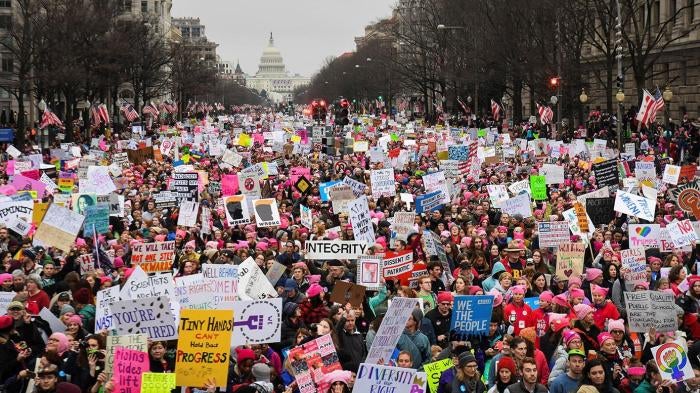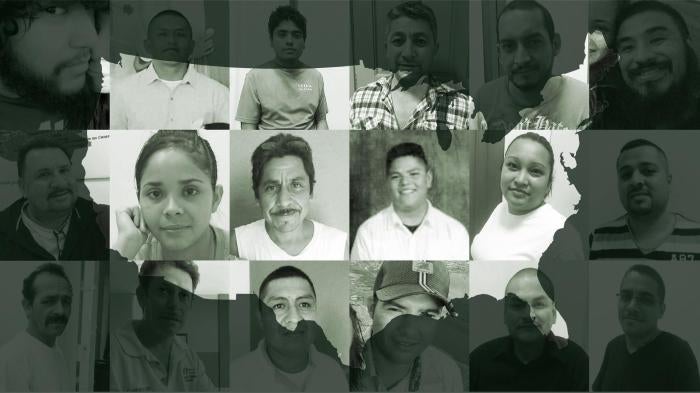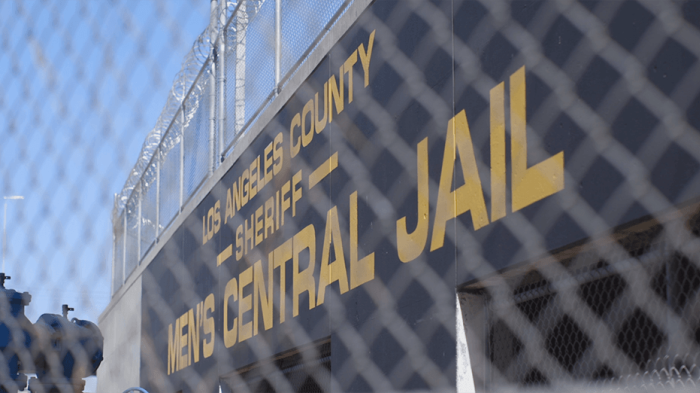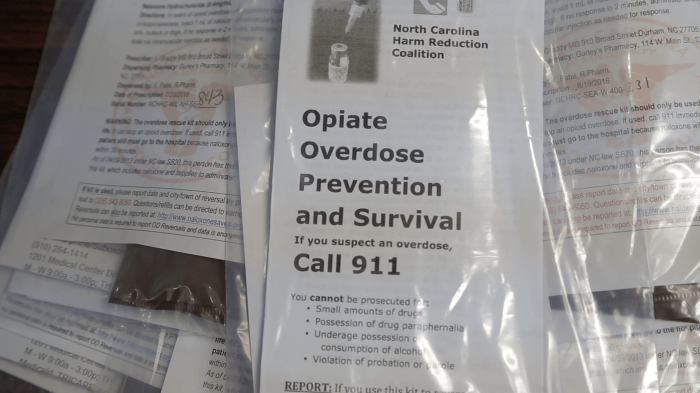The strong civil society and democratic institutions of the United States were tested in the first year of the administration of President Donald Trump. Across a range of issues in 2017, the US moved backward on human rights at home and abroad.
Trump has targeted refugees and immigrants, calling them criminals and security threats; emboldened racist politics by equivocating on white nationalism; and consistently championed anti-Muslim ideas and policies. His administration has embraced policies that will roll back access to reproductive health care for women; championed health insurance changes that would leave many more Americans without access to affordable health care; and undermined police accountability for abuse. Trump has also expressed disdain for independent media and for federal courts that have blocked some of his actions. And he has repeatedly coddled autocratic leaders and showed little interest or leadership in pressing for the respect of human rights abroad.
The individuals most likely to suffer abuse in the United States—including members of racial and ethnic minorities, immigrants, children, the poor, and prisoners—are often least able to defend their rights in court or via the political process. Many vulnerable groups endured renewed attacks on their rights during the year. Other longstanding US laws and practices—particularly related to criminal and juvenile justice, immigration, and national security—continued to violate internationally recognized human rights.
Harsh Criminal Sentencing
On any given day in the US, there are 2.3 million people in state and federal prisons and jails, the world’s largest reported incarcerated population. Concerns about over-incarceration in prisons—partly due to mandatory minimum sentencing and excessively long sentences—have led some states and the US Congress to propose reforms. At time of writing, a bipartisan proposal for sentencing and corrections reform was gaining momentum in Congress, but the Trump administration had given no indication of support.
Thirty-one US states impose the death penalty. At time of writing, 23 people in eight states had been executed in 2017, all by lethal injection. Debate over lethal injection protocols continued, with several US states continuing to use experimental drug combinations and refusing to disclose their composition.
Racial Disparities, Drug Policy, and Policing
Racial disparities permeate every part of the US criminal justice system, including in the enforcement of drug laws. Black people make up 13 percent of the population and 13 percent of all adults who use drugs, but 27 percent of all drug arrests. Black men are incarcerated at nearly six times the rate of white men.
Police continue to kill black people in numbers disproportionate to their overall share of the population. Black people are 2.5 times as likely as white to be killed by police. An unarmed black person is five times as likely to be killed by police as an unarmed white person.
The Trump administration has expressed almost unconditional support for the prerogatives of law enforcement officers, scaling back or altogether removing police oversight mechanisms. The US Department of Justice began to discontinue investigations into, and monitoring of, local police departments reported to have patterns and practices of excessive force and constitutional violations.
The administration reversed an order from the Obama administration limiting acquisition of offensive military weaponry by local police departments. In a speech in July, President Trump encouraged officers to use unnecessary force on suspects. Congress introduced the “Back the Blue Act,” which would severely restrict civilians’ rights to sue police officers who unlawfully injure them.
Despite voicing concern over the opioid crisis, the Trump administration signaled an intent to re-escalate the “war on drugs” and de-emphasize bipartisan public health approaches to drug policy. Attorney General Jeff Sessions rescinded his predecessor’s Smart on Crime initiative, which had prioritized federal prosecutions of individuals accused of high-level drug offenses, reduced racial disparities in federal drug sentencing, and improved re-entry opportunities.
Youth in the Criminal Justice System
Nearly 50,000 youth age 17 and younger are held in juvenile prisons or other confinement facilities on any given day in the US, and approximately 5,000 more are incarcerated in adult jails or prisons. Every year, 200,000 people under 18 have contact with the adult criminal system, with many children tried automatically as adults.
The US continues to sentence children to life in prison without parole, although states increasingly reject its use: as of 2017, 25 states and Washington, DC had banned or did not use the sentence for children.
Poverty and Criminal Justice
Poor defendants throughout the United States are locked up in pretrial detention because they cannot afford to post bail. A 2017 Human Rights Watch report demonstrated that pretrial detention—often resulting from failure to pay bail—coerces people, some innocent, into pleading guilty just to get out of jail. A movement to reduce the use of money bail is growing in the US, with several states implementing, and others considering, reform.
Many states and counties fund their court systems, including judges, prosecutors, and public defenders, partly or entirely via fees and fines imposed on criminal and traffic defendants. The privatization of misdemeanor probation services by several US states has led to abuses, including fees structured by private probation companies to penalize poor offenders.
Rights of Non-Citizens
One week after his January 20, 2017 inauguration, President Trump issued an executive order to suspend the US refugee program, cut the number of refugees who could be resettled into the US in 2017, and temporarily ban entry of nationals from seven Muslim-majority countries. This and later versions of the order banning entry from various countries have been the subject of ongoing federal litigation.
In October, Trump signed an executive order resuming the refugee program but with new screening measures. The annual cap for refugee admissions for 2018 was set at 45,000, the lowest annual limit since Congress passed the Refugee Act in 1980.
On the back of rhetoric falsely conflating illegal immigration with increased crime, Trump also moved to make all deportable immigrants “priority” targets for deportation, penalize so-called sanctuary cities and states that have limited local police involvement in federal immigration enforcement; expand abusive fast-track deportation procedures and criminal prosecutions for immigration offenses; and increase the prolonged detention of immigrants, despite evidence, documented by Human Rights Watch and others, of abusive conditions in immigration detention.
In August, President Trump repealed a program protecting from deportation immigrants who arrived in the United States as children, putting hundreds of thousands of people who grew up in the US at risk of deportation. President Trump signalled he would support legislation that provided legal status for undocumented immigrants brought to the United States as children. However, in October the White House released a hard-line set of immigration principles and policies—including weakening protections for child migrants and refugees—it considers necessary components of any such legislative deal.
Some cities and states sought to increase protections for immigrants by creating funds for legal services, limiting local law enforcement involvement in federal immigration enforcement, and resisting efforts to defund “sanctuary” cities. Others sought to pass laws punishing such localities.
In December, Human Rights Watch reported on the impact of the Trump administration on immigration policies, profiling dozens of long-term residents with strong family and other ties within the US who were summarily deported. US law rarely allows for individualized hearings that weigh such ties, and most immigrants do not have attorneys to help them fight deportation.
At time of writing, seizures for deportation of undocumented people from the interior without criminal convictions had nearly tripled to 31,888 between the inauguration and the end of September 2017, compared with 11,500 during approximately the same period in 2016.
Right to Health
To date, attempts in Congress to repeal the Affordable Care Act (ACA)—legislation that has greatly expanded access to health care for millions of Americans—have failed. However, the Medicaid program, private insurance subsidies, non-discrimination protections for lesbian, gay, bisexual, and transgender (LGBT) people, and other key elements of the ACA remained vulnerable to regulatory action by the Trump administration.
The Trump administration’s opioid commission released an interim report endorsing numerous public health approaches, but did not recommend protecting Medicaid, which currently covers drug dependence treatment. The commission endorsed increased access to naloxone, the overdose reversal medication, but did not recommend that it be available over the counter, a potential game-changer in addressing the more than 90 deaths per day from opioid overdose in the US.
Around 1.5 million Americans live in nursing homes, where inappropriate and nonconsensual use of antipsychotic medications—for staff convenience or to discipline residents without a medical purpose—is widespread. To date, government agencies have not taken sufficient steps to end this practice.
Rights of People with Disabilities
The Trump administration’s proposed cuts to the ACA, which provides crucial services to people with disabilities, and a proposed rollback of accessibility obligations under the Americans with Disabilities Act, could undermine the rights of people with disabilities. In July 2017, a man with a psychosocial disability, William Charles Morva, was executed in Virginia, 2017, despite pleas from lawmakers and UN experts to commute his sentence.
A 2017 Ruderman Foundation study found that one-third to one-half of all use of force by police in the US involve people with psychosocial or intellectual disabilities.
Women’s and Girls’ Rights
President Trump, his cabinet appointees, and the Republican-controlled Congress rolled back some important women’s rights protections, domestically and in foreign policy, and pledged to dismantle others. Some state governments also eroded women’s rights by introducing new laws with absurd restrictions on women’s reproductive rights. Several high-profile media revelations related to sexual harassment and misconduct reinvigorated discussions around abuses suffered by women at work and in public places.
Congress passed legislation dismantling a rule protecting family planning funds in Title X, a national program that funds services to more than 4 million Americans, ensuring access to reproductive health care. The new legislation makes it easier for states to restrict Title X grants by creating eligibility requirements that could exclude certain family planning providers, like Planned Parenthood. This will leave many women without affordable access to cancer screenings, birth control, and testing and treatment for sexually transmitted infections.
Congressional proposals to repeal the ACA would have dealt a major blow to essential women’s health services, including by preventing the nongovernmental organization Planned Parenthood from receiving federal funding, and allowing states to limit insurance coverage for an array of essential women’s health benefits. Trump’s proposed federal budget also called for massive Medicaid cuts.
Trump also issued an executive order on “promoting free speech and religious liberty,” which will cut women off from access to reproductive health services. It invites agencies to issue regulations that would allow more employers and insurers to assert “conscience-based objections” to the preventive-care mandate of the ACA, which includes contraception. Religious employers are already exempt, and religious non-profits and certain closely held corporations also have accommodations. Following Trump’s order, the Department of Health and Human Services effectively reversed the contraceptive coverage mandate by expanding exemptions to cover nearly any objecting employer.
The White House announced in August that it would scrap an equal pay initiative that was to go into effect in 2018. As a result, large employers and federal contractors will not be required to provide disaggregated information about employees’ compensation to civil rights enforcement agencies. It also revoked executive orders that required federal contractors to comply with fair pay measures and a ban on forced arbitration of sexual harassment and discrimination claims. The Department of Education announced its intention to review and change guidelines on campus sexual assault, notably the Obama-era guidance on Title IX of Education Amendments Act of 1972.
Several states adopted highly restrictive laws on abortion and reproductive health. These include new bans on abortion in some circumstances or other restrictive measures in Texas, Arkansas, Kentucky, Iowa, Tennessee. Some states increased efforts to deny public family planning funds to providers who also offer abortion services.
Despite these significant assaults on women’s human rights, the picture was not entirely grim. Congress passed the 2017 National Defense Authorization Act, which includes new protections for whistleblowers in military sexual assault cases and requires training on preventing sexual assault. Trump signed into law the Women, Peace, and Security Act of 2017, which aims to increase women’s participation in conflict prevention and security.
New York State’s 2017 law reform on child marriage dramatically reduces the circumstances under which children can marry.
Millions gathered for Women’s Marches in Washington, DC, and in cities around the world to demand equality and justice.
Sexual Orientation and Gender Identity
In the first five months of 2017, legislators in several states introduced more than 100 bills that would attack or undermine LGBT rights. In March 2017, North Carolina partially repealed a 2016 law requiring transgender people to use government facilities according to their sex assigned at birth and barring local governments from prohibiting discrimination against LGBT people. The 2017 provisions bar local governments from passing transgender-inclusive policies and prohibit local non-discrimination ordinances from protecting LGBT people until 2020.
In April, Mississippi enacted a law protecting individuals who discriminate based on their religious convictions regarding same-sex marriage, extramarital sex, and transgender people.
Tennessee enacted a law permitting therapists and counselors to decline to serve LGBT people based on their religious beliefs.
At time of writing, 20 states have laws banning workplace and housing discrimination based on sexual orientation and gender identity, while two states prohibit discrimination based on sexual orientation but not gender identity.
National Security
President Trump made statements during the presidential campaign and once in office supporting the use of torture of detainees and other counterterrorism policies that would amount to violations of US and international law. Trump later backtracked on these proposals saying he would defer to Defense Secretary James Mattis, who was outspoken against torture, on interrogation matters.
In November, the Office of the Prosecutor for the International Criminal Court (ICC) requested judicial authorization to open an investigation into alleged war crimes and crimes against humanity committed in the armed conflict in Afghanistan, including by US personnel in secret detention sites in Afghanistan and elsewhere.
At time of writing, media reported that US forces interrogated detainees in secret prisons run by foreign forces in Yemen. Defense Department officials denied that abuses had occurred when US forces were present, although their statements did not preclude possible US complicity in torture. Following the reports, the Senate Armed Services Committee sent a letter to Mattis demanding an investigation into the matter. Mattis’ response remained classified at time of writing.
Trump promised to keep the US prison at Guantanamo Bay open and send new detainees there. The US continues to hold 31 men at the facility indefinitely without charge, nearly all of whom have been there for more than a decade. The Obama administration failed to release five that it had cleared for release. It claimed the remaining 26 could neither be prosecuted nor released but did not adequately explain the basis for these determinations or allow detainees to meaningfully challenge them.
The US continues to prosecute seven men for terrorist offenses, including the 9/11 attacks on the US, in Guantanamo’s fundamentally flawed military commissions system, which does not meet international fair trial standards. It also is holding three men who have already been convicted by the commissions.
Surveillance
Throughout 2017, the US continued to carry out large-scale warrantless intelligence surveillance programs without transparency or oversight. Authorities used Section 702 of the Foreign Intelligence Surveillance Act to target non-citizens (except lawful permanent residents) outside the country for warrantless communications monitoring and to “incidentally” gather large numbers of communications to or from people in the US.
Section 702 was scheduled to end at the end of 2017 unless Congress renewed it; at time of writing federal appeals courts had differing conclusions about the constitutionality of certain aspects of the law.
US surveillance of global communications under Executive Order 12333 remained shrouded in secrecy, with neither Congress nor the courts providing meaningful oversight. In January, the government disclosed procedures for the National Security Agency (NSA) to share data with domestic law enforcement agencies obtained by surveillance under the order. Documents disclosed to Human Rights Watch during the year revealed a Defense Department policy under the order sanctioning otherwise prohibited forms of monitoring of people inside the United States designated as “homegrown violent extremists.” The Defense Department has not revealed how it designates “extremists” or what types of monitoring may result.
In May 2017, the Trump administration approved a proposal that asks US visa applicants for social media handles and accounts from the past five years as part of its enhanced vetting process. The US also continues to assert broad authority to search electronic devices and copy data at the border without any suspicion of wrongdoing.
Freedom of Expression and Assembly
In one of his last acts in office, President Obama commuted the sentence of Chelsea Manning, a soldier who had received a 35-year prison term for disclosing US diplomatic cables to WikiLeaks and endured abuse while in custody. However, the US government continued to seek the extradition from Russia of Edward Snowden, the whistleblower who revealed the scope of US mass surveillance in 2013.
In June 2017, the Justice Department indicted NSA contractor Reality Winner for allegedly disclosing classified information about possible Russian government interference in the 2016 US election. Under current US law and contrary to international human rights law, Winner will not have a chance to claim that she made her disclosures in the public interest.
President Trump repeatedly criticized journalists and posted comments and videos denigrating them during the year, prompting concerns over the chilling of freedom of speech. In August 2017, the UN High Commissioner for Human Rights expressed concern that “freedom of the press” in the United States was “under attack from the President.”
Two UN experts expressed alarm about state legislative proposals seeking to “criminalize peaceful protests,” and a third described “a militarized, at times violent, escalation of force…” against protesters opposing the Dakota Access Pipeline. In August, a woman protesting at a rally held by white supremacists in Charlottesville, Virginia, was killed when a man allegedly drove a car into the crowd; the driver was charged with murder.
In July 2017, the US Justice Department served a warrant on a company that hosted a website used to coordinate protests at the inauguration, demanding information that included more than 1.3 million Internet Protocol addresses that could identify site visitors.
Foreign Policy
During his inaugural address, Trump articulated a vision of foreign policy that placed “America First,” vowing to defeat terrorism, strengthen the US military, and embrace diplomacy based on US interests. Some foreign dignitaries invited to the White House early in his presidency included those with poor reputations on human rights, including Egyptian President Abdel Fattah al-Sisi, Malaysian Prime Minister Najib Razak, and Turkish President Recep Erdoğan.
On his first full day in office, President Trump reinstated and dramatically expanded the Mexico City Policy, or “Global Gag Rule.” This strips US health funding from foreign nongovernmental organizations if they use funds from any source to supply information about abortions, provide abortions, or advocate to liberalize abortion laws. The expanded Global Gag Rule will have disastrous effects beyond previous gag rules—restricting some $8.8 billion in foreign assistance for health services such as family planning, maternal healthcare, and services to treat HIV, malaria, and tuberculosis in 60 countries.
Affected organizations cannot easily replace these funds, which help prevent millions of unintended pregnancies, unsafe abortions, and tens of thousands of maternal deaths. The US government also severed support for the UN Population Fund, limiting the agency’s ability to provide life-saving care for women and girls, often in crisis zones.
Secretary of State Rex Tillerson has sought to overhaul the US State Department’s structure by sharply reducing the State Department’s staffing and global role, including by requesting a 29 percent decrease in funding for the State Department and international aid.
In April, the US carried out a targeted military strike on the al Shayrat Syrian airfield in response to a chemical weapons attack that killed more than 80 civilians. The April strike was not accompanied by a clear strategy for continued engagement in Syria.
During his first foreign trip in May, which began in Saudi Arabia, Trump announced a US$110 billion weapons deal with Saudi Arabia, and pledged to address human rights concerns through “gradual reforms.” Secretary Tillerson voiced concern during the same trip about lack of free speech in Iran, while ignoring equally onerous restrictions in Saudi Arabia.
In June, the US Senate voted 53-47 against a proposal that would have banned $510 million in arms sales to Saudi Arabia because of its role in the conflict in Yemen; a similar measure garnered only 27 votes in 2016. Also that month, the Trump administration announced it might withdraw from the UN Human Rights Council (UNHRC) over purported bias against Israel, among other concerns.
In July 2016, the US Congress extended through 2019 its authority to freeze assets and ban visas of Venezuelan officials accused of abuses against anti-government demonstrators. In 2017, the Trump administration imposed additional sanctions on Venezuelan officials, including President Maduro, and economic sanctions that prohibit dealings in new securities that the Venezuelan government and its state oil company issue. President Trump’s August threat to use military force against Venezuela met with widespread criticism in the region.
In August, the State Department announced that it had re-allocated some of Egypt’s US assistance and had frozen additional monies and military assistance, subject to democracy and human rights conditions.
However, joint military exercises that had been on hiatus resumed the next day. After months of review, President Trump announced his administration’s new policy on Afghanistan, calling for more US troops, expanded airstrikes, and looser rules of engagement governing anti-Taliban combat operations. The policy also calls on Pakistan to do more to prevent terrorists from harboring there, and on India to play a more influential regional role.
Speaking at the UN General Assembly in September, Trump reaffirmed his commitment to an “America First” agenda and threatened to “totally destroy North Korea,” and referred to Iran as a “rogue nation” and to the Iran nuclear deal as an “embarrassment.”
The US did not publicly support calls at the UNHRC for a commission of inquiry into abuses in Yemen, but was active during negotiations and ultimately joined consensus on a resolution to create an international investigation.
In November, Trump traveled to Asia, visiting China, Japan, South Korea, and Vietnam while in the region for the ASEAN summit in the Philippines. During the trip, Trump boasted of his good relations with authoritarian leaders and did not publicly comment on core human rights concerns, including the Rohingya crisis.
As the fighting against the extremist group Islamic State (ISIS) in Iraq and Syria continued, the number of US airstrikes and the number of civilian casualties increased significantly with little acknowledgement by the Pentagon. Strikes also resumed in Libya and increased in pace in Somalia. Trump reportedly changed US policy for drone strikes outside conventional war zones to allow attacks on lower-level terrorism suspects in more countries, with less oversight, and greater secrecy. The CIA was reportedly granted authority to carry out covert drone strikes in Afghanistan.
The Trump administration was considering withdrawing from the UNHRC, primarily because of concerns about the body's membership and its dedicated agenda item on the Occupied Palestinian Territories. Although the council's membership includes some serial rights violators, this has not prevented it from successfully addressing a wide range of human rights issues.








